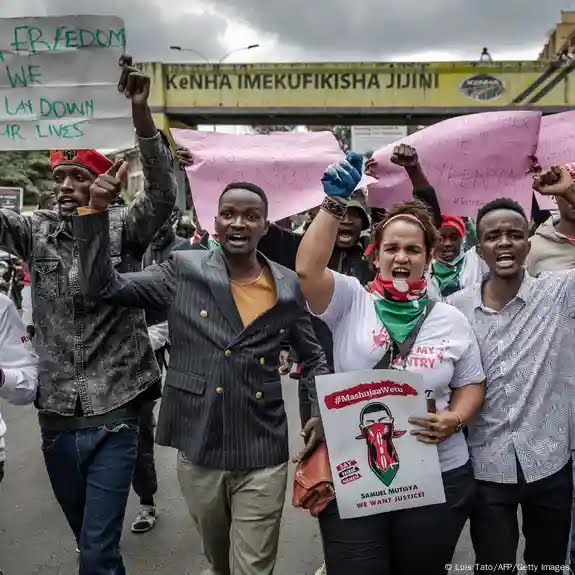The year 2024 was marked as a point of rising discontent across the African continent, with the World Bank’s Country Policy and Institutional Assessment (CPIA) 2024 Report painting a vivid picture of growing frustration among citizens, especially the youth.
According to the report, Africa experienced 7,224 protest events, which included 5,911 protests and 1,313 riots, with major unrest concentrated in Ghana, Kenya, Nigeria, and Uganda. The wave of demonstrations reflects deep-seated dissatisfaction with the quality of public service delivery, economic management, and political accountability.
This discontent is not merely anecdotal but is captured in consistent data trends across the continent. The World Bank CPIA report notes a visible increase in public dissatisfaction with governance and institutional performance, as many African governments struggle to meet the expectations of their growing and youthful populations.
Survey findings show that dissatisfaction is particularly high in the areas of infrastructure, human capital development, administrative services, and security. As a result, citizens increasingly cite poor service delivery as one of the most pressing problems in their countries.
The CPIA 2024 analysis underscores that public services in Sub-Saharan Africa lag behind other regions, even after adjusting for economic output. Inadequate transport infrastructure—covering roads, air, rail, and sea—continues to hinder access to markets and economic growth. Poor sanitation, limited access to clean water, and insufficient electricity remain widespread, with high poverty levels compounding the lack of access to essential services. These failures have real consequences on economic productivity and quality of life.
The report also highlights how human capital development is stifled by weak educational systems and under-resourced healthcare services. The region’s human capital index remains among the lowest globally, reflecting underperformance in critical areas that support individual well-being and long-term economic opportunity. At the same time, government administrative capabilities continue to rank poorly, especially in areas related to doing business. Sub-Saharan Africa was the lowest-performing region in the World Bank’s B-READY index for administrative efficiency, indicating persistent barriers for investment and entrepreneurship.
Security, another foundational public service, has also worsened over the decade. The report finds that the number of casualties from conflicts between state forces and militias has increased nearly threefold between 2014 and 2024, exposing the fragile nature of state authority in many parts of the region. This decline in basic state functions has directly contributed to citizen frustration and loss of trust in governing institutions.
Despite 2024 showing modest improvements in short-term economic indicators, the longer-term picture remains grim. Since its economic peak in 2014, Africa’s output per capita has contracted by 1.8 percent, signaling what the report calls “a lost decade.” As millions of young Africans enter the workforce, the urgency to stimulate job creation and private sector growth becomes ever more pressing. Yet fiscal pressures, rising debt, and limited access to external financing constrain the ability of governments to respond effectively.
The bar chart from Afrobarometer included in the CPIA report further reinforces this narrative. It shows rising dissatisfaction in five key government service areas between 2014/15 and 2024/25. In education, dissatisfaction rose from 21.5% to 23.5%; in health, from 22.5% to 25%; in roads and bridges, from 27% to 31%; in water and sanitation, from 31.5% to 35%; and in electricity, from 31.5% (2016/17 baseline) to nearly 35%. These findings confirm that frustration with public service quality has grown consistently, with infrastructure-related sectors now drawing the highest criticism.
The widespread protests that gripped countries like Kenya, where citizens decried tax hikes, corruption, and the burden of debt servicing, are symptomatic of a broader regional crisis. In total, only 7 of the 17 scheduled elections in 2024 resulted in incumbents being re-elected, while four elections were postponed. This political turnover underscores the fragility of incumbent governments in the face of mounting pressure from increasingly organized and vocal citizens.
The CPIA 2024 report ultimately calls for a new policy direction—one where governments place citizens’ needs at the center of decision-making. Despite favorable short-term economic conditions for reform, tight credit markets and high debt servicing costs continue to strain government capacity. Nonetheless, countries are beginning to implement fiscal prudence and revenue mobilization strategies, with improvements in primary fiscal balances noted in many IDA-eligible nations.
As Africa moves forward, the road to stability and prosperity will depend on whether governments can transform these signs of discontent into opportunities for reform. Meeting the demands of a rising, youthful population will require responsive governance, better service delivery, and a renewed social contract—one where citizens see real change, not just promises.

